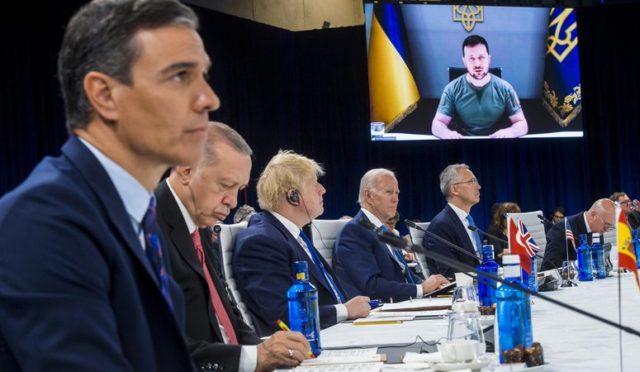
Summit Shows NATO’s Limited Relevance to Ukraine (Part Three)
Publication: Eurasia Daily Monitor Volume: 19 Issue: 105
By:

*To read Part One, please click here.
*To read Part Two, please click here.
Four months into the biggest conventional war in Europe since World War II, North Atlantic Treaty Organization (NATO) Allies did not demonstrate a coherent strategy to deal with this war at their summit in Madrid (see EDM, July 6, 7, 8, 11, November 7, 2019, Part One and Part Two). While all Allies agree on defining it as an unprovoked war of aggression and destruction, most Allies view it as a two-sided conflict between Russia and Ukraine, loath to recognize that Russia views it as a conflict between itself and the West on Ukraine’s territory.
Furthermore, while Russia regards Ukraine as the West’s proxy in this conflict, NATO remains determined to stay out of it. Instead, member countries are providing military assistance to Ukraine, calibrating assistance levels according to each country’s capacity, preferred outcome and calculations about current and postwar relations with Moscow.
Unsurprisingly, NATO has not determined a common “theory of victory” in this war—nor a shared definition of what would constitute a preferred outcome for NATO and for Ukraine. Only a few member countries recognize that Ukraine is also fighting for the West to contain Russia’s expansion.
NATO’s lowest-common-denominator position—often voiced by Secretary-General Jens Stoltenberg—holds that the Alliance must, above all, not become involved in a conflict with Russia, avoid becoming party to the war between Russia and Ukraine and do everything possible to ensure the war does not spill over beyond Ukraine. However, the obverse facet of the common position (as Stoltenberg regularly points out) allows member countries, singly or in coordination, to provide unprecedented levels of military assistance to Ukraine (Nato.int).
While unprecedented indeed, the assistance thus far has helped Ukraine merely conduct defensive operations, retreating and losing territory to Russia step-by-step, while Russian aviation and missile strikes destroy Ukrainian cities and infrastructure deep behind the front lines. NATO, both collectively and at the member-country level, has thus far ruled out delivery of combat aircraft to Ukraine, a no-fly zone over Ukraine or an Allied naval presence in the Black Sea. Nor is Ukraine allowed to hit military targets in Russia’s territory, even as the Russian military strikes Ukraine with long-range artillery, missiles and tactical aircraft from Russian territory. NATO Allies had already withdrawn their military instructors from Ukraine and their naval presence from the Black Sea in the run-up to Russia’s February 24 re-invasion of Ukraine.
The Summit Declaration urges, “Russia must immediately stop this war and withdraw from Ukraine. We reiterate our unwavering support for Ukraine’s independence, sovereignty and territorial integrity within its internationally recognized borders extending to its territorial waters” (Nato.int, June 29). However, the level of military assistance for Ukraine thus far is not commensurate to those principles. Russia would not “stop and withdraw” from Ukraine’s lands and waters unless forced to do so.
Some of the most influential NATO Allies seem to contemplate an inconclusive war that would end in a compromise settlement, entailing some Ukrainian territorial sacrifices to Russia. Such a course of action would supposedly mitigate the risks and costs of confronting Russia. Thus, French President Emmanuel Macron has repeatedly hinted at a compromise scenario and his readiness to serve as mediator. For his part, German Chancellor Olaf Scholz has been saying either that “Russia must not win” or that “Ukraine must not lose,” almost always in separate sentences, hardly ever including both sides in a single sentence.
Meanwhile, the United States remains by far the largest donor of military assistance to Ukraine. Nevertheless, in the run-up to the NATO summit and during it, President Joe Biden has suggested merely avoiding a Ukrainian defeat, rather than helping Ukraine win (The New York Times, May 31; Whitehouse.gov, June 30; The Wall Street Journal, July 10).
For its part, the British government proposes to help arm and train Ukrainian forces for victory. London considers it possible for Ukraine, if properly armed, to turn the tide this year and drive Russian troops from Ukraine within a limited period. Outgoing Prime Minister Boris Johnson spoke in support of this view, and the post-Johnson government shares it. So do most NATO countries in Central and Eastern Europe. At the Alliance‘s summit, Spanish Prime Minister Pedro Sanchez (hosting the event) stated that Allies should “fully support Ukraine until the last Russian soldier leaves Ukraine’s territory” (Ukraiynska Pravda, June 30). Stoltenberg, in his concluding briefing, called for “mak[ing] sure that Ukraine prevails”—a more forward-leaning stance than that of most Western member countries (Nato.int, June 30).
While the Alliance’s collective statements and those of some member countries call on Russia to withdraw its troops from Ukraine, how this would look in practice is far from clear. Many Western diplomats suggest, unofficially or semiofficially, that withdrawing to the lines that existed prior to February 24 would be deemed satisfactory. Ukrainian President Volodymyr Zelenskyy has also hinted at this occasionally. However, should Russia keep gaining ground, it can be expected that the Kremlin will call for drawing new lines more deeply inside Ukraine.
For the time being, all Allies are agreed that it is up to Ukraine to define what constitutes an acceptable political and territorial settlement. But even this minimalist consensus may become irrelevant if Western support fails to turn the tide of war in Ukraine’s favor. In that case, Ukraine might find itself confronted diplomatically with suggestions to accept a further round of territorial losses with a Minsk Three dispensation. This would, at the same time, mark a severe strategic defeat for NATO writ large.



